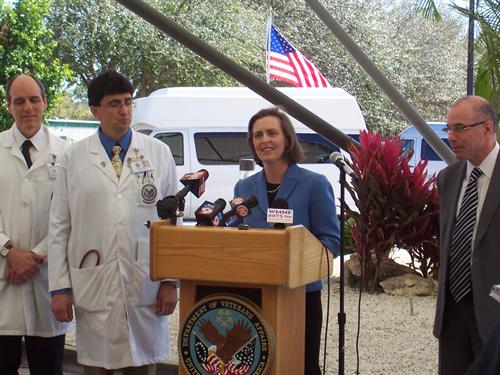Article
Haley, USF To Study Troops' Traumatic Brain InjuriesBy JOHN W. ALLMAN, The Tampa Tribune
Tampa,
February 11, 2008
|
Agustina Guerrero
((813)871-2817)
Monday, flanked by doctors and academics, U.S. Rep. Kathy Castor, D-Tampa, announced a new partnership to study brain injuries between James A. Haley VA Medical Center and the University of South Florida's Colleges of Medicine, Nursing and Public Health.
They call it an invisible wound, and it's quickly becoming known as the signature injury of troops fighting in Iraq and Afghanistan.
In reality, traumatic brain injuries are likely as old as war itself. Monday, flanked by doctors and academics, U.S. Rep. Kathy Castor, D-Tampa, announced a new partnership to study brain injuries between James A. Haley VA Medical Center and the University of South Florida's Colleges of Medicine, Nursing and Public Health. Specifically, the partnership will apply for a portion of a $450 million federal grant included in the 2008 National Defense Authorization Act to fund treatment and research efforts. Traumatic brain injuries can leave some troops comatose or severely impaired, and others recover. "We don't understand why, but somehow they do," said Steven Scott, director of Haley's Polytrauma Rehabilitation Center. "It's an injury we don't know much about," he continued. "We don't know much more now than in 1910 or 1915." Scott said Monday as many as 15 percent to 20 percent of active troops can suffer traumatic brain injuries. Often, they have multiple injuries because of increased use of roadside bombs where concussive blasts can leave unseen but lasting effects on the brain. Many troops are serving multiple tours of duty, which heightens their chances of being affected. In previous wars, many of those personnel never would have left the battlefield. "We're seeing kids, young folks, with injuries they never would have survived," said Stephen Klasko, vice president of USF's health science center and dean of the college of medicine. "Now you have the ability not only for those patients to survive, but lead productive lives." Klasko said that by naming USF and Haley in the legislation, the partnership has moved into the top tier of likely grant recipients. The proximity of the hospital and university, which are on opposite sides of Bruce B. Downs Boulevard, also helps, he said, as does Tampa being home to U.S. Central Command. Receiving a portion of funds also will help the university and hospital recruit the best and brightest minds for research and study. "The care that we provide here will set the benchmark throughout the nation," said Edward P. Cutolo Jr., Haley's chief of staff. Haley is one of just polytrauma centers in the United States, and it is considered the busiest VA hospital in the country. In addition, Castor is pushing for enhanced screening of returning soldiers to determine whether they have been exposed to blasts. Such information may be vital to better understanding the injury and its effects. "This should be, and will be, a place where additional research will take place," she said. http://www2.tbo.com/content/2008/feb/12/me-haley-usf-partner-for-research/ |


